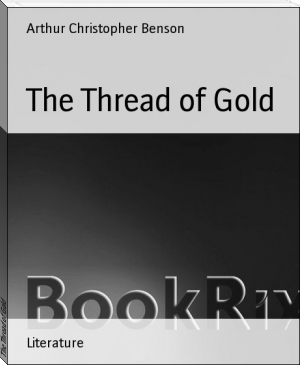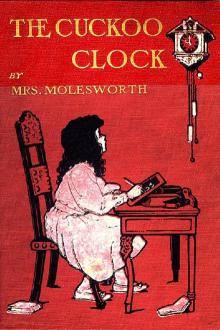The Thread of Gold, Arthur Christopher Benson [free ebook reader for pc .TXT] 📗

- Author: Arthur Christopher Benson
Book online «The Thread of Gold, Arthur Christopher Benson [free ebook reader for pc .TXT] 📗». Author Arthur Christopher Benson
Quem locum nosti mihi destinatum?
Quo meos gressus regis?
CONTENTS
Preface
Introduction (1906)
Introduction
I. The Red Spring
II. The Deserted Shrine, The Manor House
III. Leucocholy
IV. The Flower
V. The Fens
VI. The Well and the Chapel
VII. The Cuckoo
VIII. Spring-time
IX. The Hare
X. The Diplodocus
XI. The Beetle
XII. The Farm-yard
XIII. The Artist
XIV. Young Love
XV. A Strange Gathering
XVI. The Cripple
XVII. Oxford
XVIII. Authorship
XIX. Hamlet
XX. A Sealed Spirit
XXI. Leisure
XXII. The Pleasures of Work
XXIII. The Abbey
XXIV. Wordsworth
XXV. Dorsetshire
XXVI. Portland
XXVII. Canterbury Tower
XXVIII. Prayer
XXIX. The Death-bed of Jacob
XXX. By the Sea of Galilee
XXXI. The Apocalypse
XXXII. The Statue
XXXIII. The Mystery of Suffering
XXXIV. Music
XXXV. The Faith of Christ
XXXVI. The Mystery of Evil
XXXVII. Renewal
XXXVIII. The Secret
XXXIX. The Message
XL. After Death
XLI. The Eternal Will
XLII. Until the Time
Conclusion
PREFACE
I sate to-day, in a pleasant hour, at a place called The Seven Springs, high up in a green valley of the Cotswold hills. Close beside the road, seven clear rills ripple out into a small pool, and the air is musical with the sound of running water. Above me, in a little thicket, a full-fed thrush sent out one long-drawn cadence after another, in the joy of his heart, while the lengthening shadows of bush and tree crept softly over the pale sward of the old pasture-lands, in the westering light of the calm afternoon.
These springs are the highest head-waters of the Thames, and that fact is stated in a somewhat stilted Latin hexameter carved on a stone of the wall beside the pool. The so-called Thames-head is in a meadow down below Cirencester, where a deliberate engine pumps up, from a hidden well, thousands of gallons a day of the purest water, which begins the service of man at once by helping to swell the scanty flow of the Thames and Severn Canal. But The Seven Springs are the highest hill-fount of Father Thames for all that, streaming as they do from the eastward ridge of the great oolite crest of the downs that overhang Cheltenham. As soon as those rills are big enough to form a stream, the gathering of waters is known as the Churn, which, speeding down by Rendcomb with its ancient oaks, and Cerney, in a green elbow of the valley, join the Thames at Cricklade.
It was of the essence of poetry to feel that the water-drops which thus babbled out at my feet in the spring sunshine would be moving, how many days hence, beside the green playing-fields at Eton, scattered, diminished, travel-worn, polluted; but still, under night and stars, through the sunny river-reaches, through hamlet and city, by water-meadow or wharf, the same and no other. And half in fancy, half in earnest, I bound upon the heedless waters a little message of love for the fields and trees so dear to me.
What a strange parable it all made! the sparkling drops so soon lost to sight and thought alike, each with its own definite place in the limitless mind of God, all numbered, none forgotten; each drop,--bright, new-born, and fresh as it appeared, racing out so light-heartedly into the sun,--yet as old, and older, than the rocks from which it sprang! How often had those water-drops been woven into cloud-wreaths, through what centuries they had leapt and plunged among sea-billows, or lain cold and dark in the ocean depths, since the day when this mass of matter that we call the earth had been cut off and sent whirling into space, a molten drop from the fierce vortex of its central sun! And, what is the strangest thought of all, I can sit here myself, a tiny atom spun from drift of storms, and concourse of frail dust, and, however dimly and faintly, depict the course of things, trace, through some subtle faculty, the movement of the mind of God through the aeons; and yet, though I can send my mind into the past and the future, though I can see the things that are not and the things that are, I am denied the least inkling of what it all signifies, what the slow movement of the ages is all aimed at, and even what the swift interchange of light and darkness, pain and pleasure, sickness and health, love and hate, is meant to mean to me--whether there is a purpose and an end at all, or whether I am just allowed, for my short space of days, to sit, a bewildered spectator, at some vast and unintelligible drama.
Yet to-day the soft sunshine, the babbling springs, the valley brimmed with haze, the bird's sweet song, all seem framed to assure me that God means us well, urgently, intensely well. "My Gospel," wrote one to me the other day, whose feet move lightly on the threshold of life, "is the Gospel of contentment. I do not see the necessity of asking myself uneasy and metaphysical questions about the Why and the Wherefore and the What." The necessity? Ah, no! But if one is forced, against one's will and hope, to go astray in the wilderness out of the way, to find oneself lonely and hungry, one must needs pluck the bitter berries of the place for such sustenance as one can. I doubt, indeed, whether one is able to compel oneself into and out of certain trains of thought. If one dislikes and dreads introspection, one will doubtless be happier for finding something definite to do instead. But even so, the thoughts buzz in one's ears; and then, too, the very wonder about such things has produced some of the most beautiful things in the world, such as Hamlet, or Keats' Ode to the Nightingale, things we could not well do without. Who is to decide which is the nobler, wiser, righter course? To lose oneself in a deep wonder, with an anxious hope that one may discern the light; or, on the other hand, to mingle with the world, to work, to plan, to strive, to talk, to do the conventional things? We choose (so we call it) the path that suits us best, though we disguise our motives in many ways, because we hardly dare to confess to ourselves how frail is our faculty of choice at all. But, to speak frankly, what we all do is to follow the path where we feel most at home, most natural; and the longer I live the more I feel that we do the things we are impelled to do, the works prepared for us to walk in, as the old collect says. How often, in real life, do we see any one making a clean sweep of all his conditions and surroundings, to follow the path of the soul? How often do we see a man abjure wealth, or resist ambition, or disregard temperament, unexpectedly? Not once, I think, to speak for myself, in the whole of my experience.
This, then, is the motif of the following book: that whether we are conquerors or conquered, triumphant or despairing, prosperous or pitiful, well or ailing, we are all these things through Him that loves us. We are here, I believe, to learn rather than to teach, to endure rather than to act, to be slain rather than to slay; we are tolerated in our errors and our hardness, in our conceit and our security, by the great, kindly, smiling Heart that bade us be. We can make things a little easier for ourselves and each other; but the end is not there: what we are meant to become is joyful, serene, patient, waiting momently upon God; we are to become, if we can, content not to be content, full of tenderness and loving-kindness for all the frail beings that, like ourselves, suffer and rejoice. But though we are bound to ameliorate, to improve, to lessen, so far as we can, the brutal promptings of the animal self that cause the greatest part of our unhappiness, we have yet to learn to hope that when things seem at their worst, they are perhaps at their best, for then we are, indeed, at work upon our hard lesson; and perhaps the day may come when, looking back upon the strange tangle of our lives, we may see that the time was most wasted when we were serene, easy, prosperous, and unthinking, and most profitable when we were anxious, overshadowed, and suffering. The Thread of Gold is the fibre of limitless hope that runs through our darkest dreams; and just as the water-drop which I saw break to-day from the darkness of the hill, and leap downwards in its channel, will see and feel, in its seaward course, many sweet and gentle things, as well as many hard and evil matters, so I, in a year of my pilgrimage, have set down in this book, a frank picture of many little experiences and thoughts, both good and evil. Sometimes the water-drop glides in the sun among mossy ledges, or lingers by the edge of the copse, where the hazels lean together; but sometimes it is darkened and polluted, so that it would seem that the foul oozings that infect it could never be purged away. But the turbid elements, the scum, the mud, the slime--each of which, after all, have their place in the vast economy of things--float and sink to their destined abode; and the crystal drop, released and purified, runs joyfully onwards in its appointed way.
A. C. B.
CIRENCESTER, 8th April 1907.
INTRODUCTION (1906)
I am glad to have the opportunity of saying a few words in my own name about this book, because the original introduction seems to have misled some of my readers; and as I have had many kind, encouraging, and sacred messages about the book from very unexpected quarters, I should like to add a few further words of explanation.
One of the difficulties under which literary art seems to me to labour is that it feels bound to run in certain channels, to adopt stereotyped and conventional media of expression. What can be more conventional than the average play, or the average novel? People in real life do not behave or talk--at least, this is my experience--in the smallest degree as they behave or talk in novels or plays; life as a rule has no plot, and very few dramatic situations. In real life the adventures are scanty, and for most of us existence moves on in a commonplace and inconsequent way. Misunderstandings are not cleared up, complexities are not unravelled. I think it is time that more unconventional forms of expression should be discovered and used; and at least, we can try experiments; the experiment that I have here tried, is to present a sort of liber studiorum, a portfolio of sketches and impressions. The only coherence they possess is that, at the time when they were written, I was much preoccupied with the wonder as to whether an optimistic view of life was justified. The world is a very mysterious place, and at





Comments (0)